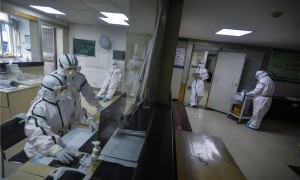She gently refused to accept the gifts. 她委婉地拒绝接受那些礼物。
How beautifully your wife dances. 你夫人舞跳的真美。
2)还有相当多的副词,表示某些情绪:
This I gladly accepted. 这东西我高兴的接受了。
She smiled gratefully. 她感激的笑了笑。
He looked at her sadly. 他凄然的看了看她。
3)还有一些以-ly结尾的副词,表示动作发生的状况:
He left the town secretly. 他悄然离开了这座城市。
I only met her accidentally. 我只是偶然碰见她的。
4 程度副词和强调副词
1)程度副词可修饰动词,表示“到某种程度”:
He loved his mother dearly. 他深爱他的母亲。
I strongly object to your saying that. 我强烈反对你这样说话。
Is she badly hurt? 她伤得重吗?
这类副词除修饰动词外,还可修饰形容词(a)或另一副词(b):
a. fairly simple 相当简单
awfully sorry 非常抱歉
quite correct 完全正确
truly grateful 确实很感激
b. fairly smoothly 相当顺利地
wonderfully well 好极了
know fully well 完全清楚
do it very quickly 干得很快
2)强调副词和程度副词很接近,有些就是程度副词。它们主要是对所修饰的动词(a)、形容词(b)加以强调:
a. I quite agree. 我完全同意。
He knew absolutely nothing. 他是毫无所知的。
Your attitude simply amazes me. 你的态度简直使我吃惊。
b. You’re entirely wrong. 你完全错了。
She’s perfectly correct. 她完全正确。
The food is just wonderful. 这饭菜简直好极了。
3)much 是一个特殊的程度副词,它可以:
a. 修饰副词(特别是用在否定句中):
She didn’t talk much. 她不怎么说话。
I don’t much like the idea. 我不大喜欢这个想法。
Thank you very much. 非常感谢你。
b. 修饰形容词等;
I’m not much good at singing. 我唱歌不太好。
I’m very much afraid that she won’t come. 我很担心她不来。
c. 和形容词或副词的比较级或最高级连用:
You sing much better than me. 你比我唱的好多了。
Their house is much nicer than ours. 他们的房子比我们的好多了。
d. 和how, so , too等词连用:
How much do you like him? 你喜欢他到什么程度?
He would so much like to go. 他会很想去的。







